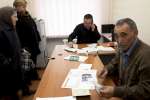Statelessness Q&A: Canada helps ex-Dane out of Bermuda triangle
News Stories, 29 August 2011
BEAMSVILLE, Canada, August 29 (UNHCR) – Earlier this year, with his wife and two sons proudly looking on, Jens Hansen took an oath of citizenship at a government office in the city of Hamilton on Canada's Lake Ontario. But there was one big difference between him and the others taking the oath that day – the 47-year-old had been officially stateless for more than two decades. Born in the Netherlands to a Dutch mother and a Danish father, Hansen took the nationality of his father. But in 1989, when he was 25, the young man discovered that he had lost his nationality. He ended up moving to the British overseas territory of Bermuda, where he met and married Carolynn. They eventually moved to her native Canada, where Hansen was given residency rights. But until January 10 he had no nationality – a status shared by what is estimated to be up to 12 million people around the world. The new Canadian citizen has not suffered much for being stateless, but for many people in the world it means they cannot access many of the rights that most people take for granted. To mark the 50th anniversary of the 1961 Convention on the Reduction of Statelessness, UNHCR on August 25 launched a campaign aimed at reducing the numbers of stateless people worldwide and getting more countries to accede to the two UN conventions on statelessness. Meanwhile, Hansen reflected on his situation in an exchange of e-mails from his home in Beamsville with Ottawa-based UNHCR Public Information Associate Gisèle Nyembwe. Excerpts:
How did you become stateless?
I became stateless because I had not renewed my Danish citizenship at the age of 22. I was unaware of having to renew my citizenship, although it did state this in the back of my passport. The problem was I'd never lived in Denmark and couldn't speak Danish. I only spent a Christmas weekend there when I was seven. I was born in Dordrecht, Holland, but took my father's nationality, which was Danish. He did not spend much time in Denmark either, being an expatriate all his life. We lived in Nigeria, Iran, Holland and England.
How did you find out that you were stateless?
I found out when I landed a job for a printing company in Bermuda in 1989. I was living in England at the time, aged 25. I paid a visit to the Danish Embassy in London to make sure everything was in order before I started my new life in Bermuda. I walked up to the front desk and showed the nice lady my passport and asked her if there was anything I needed to do. She started to speak to me in Danish, but I soon stopped her and said I didn't speak a word of it. She gave me a look of surprise and immediately pulled my file. A few minutes later she told me I was no longer entitled to citizenship since I hadn't reapplied for it when I was 22.
However, she noticed that I'd been issued with a new passport when I was 23. She said this had been a mistake. She took my passport, punched it with holes and that was that! I was now a man without a country. I applied a few weeks later for a British certificate of identity from the Home Office in London, since I was a resident of the United Kingdom. This allowed me to travel to Bermuda a year later.
How did being stateless affect your life?
Life in Bermuda was fantastic, but the issue of being stateless was always at the back of my mind. I also knew that my British certificate of identity was only valid for five years. I returned to London in 1995 to renew it, but my application was turned down since I was not a resident of the UK. I returned to Bermuda, but was unable to leave the island for the next six years.
I had no travel documents and was marooned on an island only 22 miles long and two miles across at its widest point. Bermudans call their tiny country, "the rock," and make regular trips by plane to get away from its claustrophobic atmosphere and avoid "rock fever." I wasn't able to do this. My only escape was to go scuba-diving. My wife and two sons occasionally travelled to Canada to visit relatives, leaving me behind.
What did you do to try and remedy the situation?
My father worked tirelessly, writing to his local member of parliament in the UK, to the Danish Embassy, the Home Ministry and even the Human Rights Society in London, but to no avail. I did not meet any of their criteria. Dutch citizenship was not an option; I spoke to the Dutch consul in Bermuda, only to be turned down. I discovered that nationality legislation in the Netherlands stipulates that a person born before 1985 derives nationality from their father only . . . I couldn't apply for Bermudan status since my parents were not from Bermuda.
Did you ever think that your status would never change?
I felt sure that the situation would change when I decided to move on from Bermuda. I was married to a Canadian and, after the birth of our second son, we felt it was time to move on. I applied for entry into Canada without a passport. I was extremely fortunate – the whole process only took a few months. My wife and sons left Bermuda in the spring of 2001 and it took until November of that year before I could join them after receiving the necessary documents to get me into Canada as a landed immigrant.
On arriving in Toronto, I remember the look of surprise on the faces of the Canadian immigration officers when they realized that I was stateless. They had never come across a situation like mine. They wondered if I had broken any laws, if I was a criminal. No, I was just an ex-Dane.
How important is having a nationality for you?
Before gaining Canadian citizenship, I had spent my whole life as a foreigner in whatever country I lived in. Even in the country of my birth, I was still a foreigner. To be recognized as a citizen of a country is a huge deal for me. I now have rights that I never had before. I can finally vote for the first time and I'm taking more interest in politics and important local issues. Being a citizen means having a voice that counts. Who knows what my new life as a Canadian citizen will lead to? I am also free to travel anywhere I want to. I couldn't even get into the United States, which is only half-an-hour away from my home. I am a citizen of Canada, and I belong. I have been extremely fortunate, even blessed, living in this country. Canada has been very good to me and I shall be very good to Canada!









































